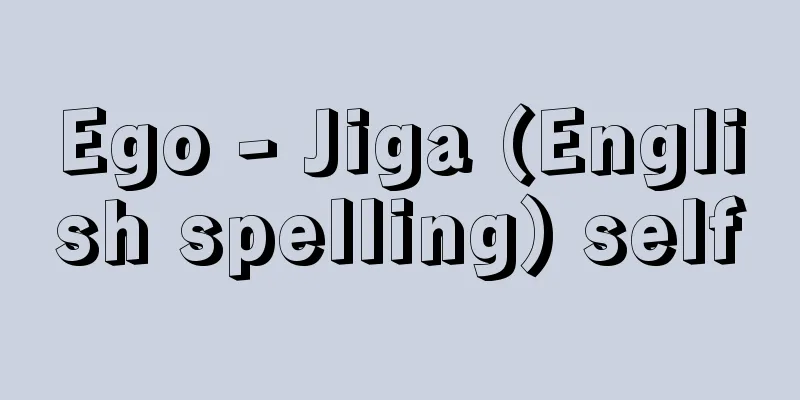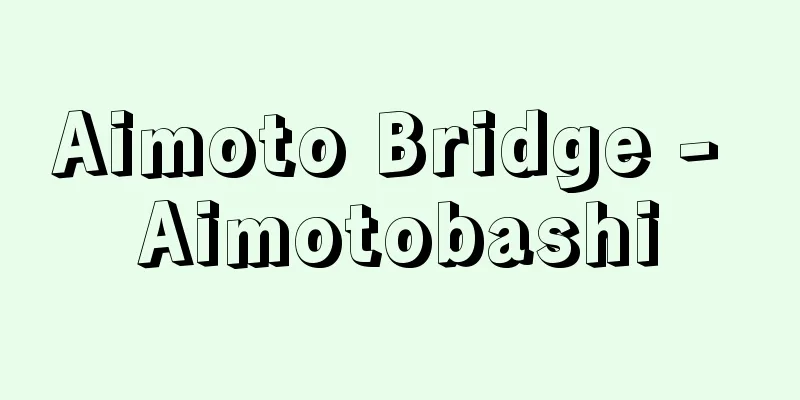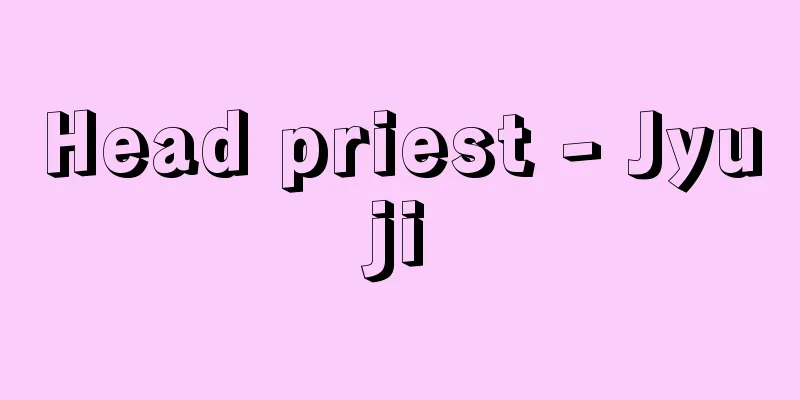Ego - Jiga (English spelling) self

|
It refers to the person who carries out various actions such as thought, will, and action. The task of philosophy is the exploration of the self, which can be said to be a response to the Delphic proverb "Know thyself." The words of the Greek philosopher Heraclitus, "I sought myself," can be seen as a response. It was Socrates who truly embodied this "know thyself." Through his awareness of the "knowledge of ignorance," Socrates opened up the horizon of philosophy of loving and seeking knowledge. However, it was with Descartes that the problem of the ego emerged as a fundamental problem in philosophy. Through methodological doubt, Descartes arrived at the "existence of the self" which could never be doubted, and found the first and most certain knowledge there. For Descartes, the "self" is a thinking entity. In contrast, Hume considered the self to be merely a bundle of perceptions, and denied the substantiality of the self. Kant held that "I think" must be able to accompany every representation of me, and sought the ultimate basis of the possibility of experience in this transcendental ego, which is distinct from the empirical ego. The idea of this ego as a substance is denied. In Kantian ethics, the moral personality as "I will" corresponds to this transcendental ego. Husserl's phenomenology proves that the true nature of the human ego is the transcendental ego by revealing what was concealed in the ego in the natural attitude. It is an attempt to recover the self from self-forgetfulness, and this self-reflection is phenomenology. Phenomenology therefore gives new meaning to the Delphic proverb "Know thyself." Existential philosophy deepens the problem of the ego into existence. It shows the finiteness of human beings and the mystery of "I am" through the analysis of death, anxiety, limit situations, etc. Today, the problem of the ego is seen as the collapse of the ego's independence. However, the collapse of the ego can also be seen as liberation from the idolization of the ego. If the maxim "Know thyself" encourages humans to be aware that they are not gods, then it also signifies the recognition of something beyond the ego. The ego will continue to be a fundamental issue in philosophy, and "know thyself" will always demand a new response. This is because the ego is this "I" in the first place, and "I am = I am" is a mystery and a wonder. [Ryoichi Hosokawa] The ego in psychologyThe concept of ego in psychology is not necessarily clear-cut, and is used in a variety of meanings. In general, one is aware of oneself as someone who feels, thinks, and acts in various ways, and this conscious and acting subject is called the ego. However, the concept of ego is also used to have other specific meanings. Among them, the concept of ego proposed by the Austrian psychiatrist Freud has a unique meaning. [Yutaka Haruki] Ego and SelfThe self that exists here actually exists as a unified whole, but when we look back analytically and reflectively at that self, we can divide it into the self that knows and the self that is known, as American psychologist W. James once said. The former is sometimes called the ego and the latter is sometimes called the "self," but the words ego and self are not always used in such a clear-cut way, and they are often confused. There are various discussions about what the ego itself is as a subject, but it can be divided into theories that say it is the thing that is directly experienced as the subject of one's own consciousness and actions, and theories that say it is a concept that was devised because of the need for something to unify and control one's conscious and behavioral activities. Such an ego functions to autonomously control oneself, organize consciousness and actions, act appropriately and proactively in response to environmental circumstances, reflect on one's own actions, maintain value standards for one's own behavior, and achieve harmony between the self and the environment, thereby maintaining one's true self. [Yutaka Haruki] Freud and Jung's egoFreud's concept of ego is used as a part of his theory of personality. In other words, personality is composed of the id (Es), which acts based on instinctual desires, the superego, which acts according to social norms, and the ego, which controls these desires and acts to adapt to the real environment. In this sense, the ego is considered to be at the center of personality and has the function of achieving harmony and control of the whole. Swiss psychiatrist Jung further uses the concept of self as something that controls both the ego, which is at the center of consciousness and controls it, including the unconscious. This ego develops and changes with age, and also takes on various forms depending on the cultural environment. [Yutaka Haruki] "New Edition of Psychology of the Ego" by Haruo Kitamura (1977, Seishin Shobo) " "Psychology of Self-Consciousness" by Eiichi Kajita (1980, University of Tokyo Press)" [References] | |Source: Shogakukan Encyclopedia Nipponica About Encyclopedia Nipponica Information | Legend |
|
思考、意志、行為などの諸作用の遂行者をいう。哲学の課題は自我の探究であり、それはデルフォイの箴言(しんげん)「汝(なんじ)自身を知れ」への応答であるといえるだろう。ギリシアの哲学者ヘラクレイトスの「我は我自らを求めたり」ということばは、その応答とみることができる。この「汝自身を知れ」を真に体現したのはソクラテスである。ソクラテスは「無知の知」の自覚を通して、知を愛し求めるという哲学の地平を切り開いた。 しかし自我の問題が哲学の根本問題として登場したのはデカルトにおいてである。デカルトは方法的懐疑によって、けっして疑うことのできない「我の存在」に達し、そこに最初のもっとも確実な知識をみいだした。デカルトにおいて我は思惟(しい)する実体である。それに対しヒュームは自我を知覚の束にすぎないとし、自我の実体性を否定した。カントはあらゆる私の表象に「我思惟す」が伴うことができねばならないとし、経験的自我とは区別されるこの超越論的自我のうちに、経験の可能性の究極の根拠を求めた。この自我を実体とすることは否定される。カント倫理学においてこの超越論的自我に対応するのが、「我意志す」としての道徳的人格である。フッサール現象学は、自然的態度にある自我において隠蔽(いんぺい)されていたものを開示することによって、人間的自我の真実態が超越論的自我であることを証示する。それは自己忘却から自己を取り戻す試みであり、この自己省察こそが現象学である。現象学はそれゆえデルフォイの箴言「汝自身を知れ」に新たな意味を与えたといえる。実存哲学は自我の問題を実存へと深化した。それは死、不安、限界状況などの分析を通して、人間の有限性、「私がある」ことの神秘を示した。 自我の問題は今日、自我の自立性の崩壊としてとらえられる。しかし自我の崩壊は、自我の偶像化からの解放とみることができる。「汝自身を知れ」という箴言が、人間に、神ならぬ身であることの自覚を促すものであるとすれば、それは同時に、自我を超えたものの承認を意味するであろう。今後とも、自我は哲学の根本問題であり続け、「汝自身を知れ」はつねに新たな応答を要求するであろう。自我とはそもそもこの私であり、「私がある=私である」は神秘であり、驚異だからである。 [細川亮一] 心理学における自我心理学における自我egoの概念は、かならずしも明確なものではなく、また多様な意味に使われている。一般には、いろいろなものを感じたり、考えたり、行動したりする自分というものを自覚するが、この意識したり行動したりする自分の主体を自我という。しかし、自我という概念は、このほかにも特定の意味をもつものとして使われている。そのなかでもオーストリアの精神科医フロイトの自我の概念は独特の意味をもっている。 [春木 豊] 自我と自己現にここにある自分は統一的な全体として存在しているものであるが、その自分について分析的、反省的に振り返ってみたとき、たとえば、かつてアメリカの心理学者W・ジェームズがいっているように、知る主体としての自分と、知られる客体としての自分に分けることができる。前者を自我といい、後者を「自己」と区別することがあるが、自我と自己のことばはかならずしもこのように明確に分けて使われるとは限らず、混同されることも多い。 主体としての自我そのものが何であるかさまざまな議論があるが、それは、自分の意識や行動の主体として直接に経験されるものそれ自体であるとする説、あるいは自分の意識的・行動的活動を統一し、統制するものが必要であるとして、考え出された概念であるとする説などに分けられる。 このような自我は、自分を自律的に統制し、意識や行動を整理し、環境の状況に応じて自分を適切に積極的に行動させ、自分の行動に対する反省を行い、自らの行動の価値規準を維持し、自己と環境との調和を図って、自分であることを維持するための機能を果たしている。 [春木 豊] フロイトとユングの自我フロイトの意味した自我の概念は、彼の人格論の一部を構成するものとして使われている。すなわち、人格は本能的欲求に基づいて行動するエスEs(イドid)、社会的規範に従って行動する超自我、それにこれらの欲求を統制し、現実の環境に適応すべく行動する自我から成り立っているとする。ここにおいては自我は、人格の中軸にあって、全体の調和、統制を図る機能をもつものとして考えられているといえる。スイスの精神科医ユングはさらに、意識の中心にあって、それを統制しているのは自我であるが、無意識を含めて、両者の全体を統制するものとして、自己の概念を用いている。 このような自我は、年齢とともに発達し変容していくし、また文化的な環境によって、さまざまな様相がみられる。 [春木 豊] 『北村晴朗著『新版 自我の心理学』(1977・誠信書房)』▽『梶田叡一著『自己意識の心理学』(1980・東京大学出版会)』 [参照項目] | |出典 小学館 日本大百科全書(ニッポニカ)日本大百科全書(ニッポニカ)について 情報 | 凡例 |
>>: Magnetization - Direct (English spelling) magnetization
Recommend
Ganglion - nerve ganglion
A nodular swelling formed by the collection of ner...
Merano (English spelling)
Meran in German. A city in the foothills of the Al...
Kakegoto
...It is a game in which money or items are bet o...
Yunoyama [Hot spring] - Yunoyama
A hot spring located in Komono Town, Mie Prefectur...
Umoreougigani - Umoreougigani
This crab belongs to the order Decapoda, class Cr...
Drawing paper - Gayoushi
Although it is a paper used widely for painting, ...
Conical surface
A surface formed by lines connecting all points on...
Emperor Watai
79‐105 China, later Han The fourth emperor of the ...
Real Estate Execution
Compulsory execution is carried out against real e...
Foot soldiers - Kachigumi
A job title in the Edo Shogunate. It is said to h...
Ventilation rate - kankikaisuu
…The minimum or recommended ventilation volume re...
Vowel change - Vocalic change
Historical changes in vowels. There are two types ...
Electron transport chain
A system that transfers electrons or hydrogen in b...
Long lecture hall
Located in Shimogyo Ward, Kyoto City, it is a Jodo...
Karibu Kyosei Noudan - Karibu Kyosei Noudan
...It also has a facility for the disabled, Oyama...









